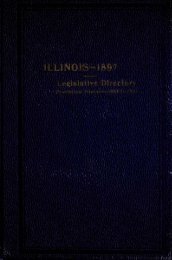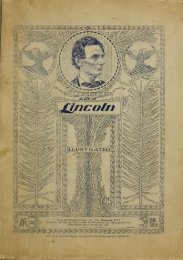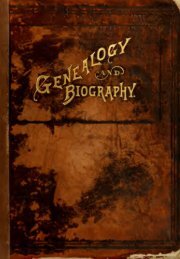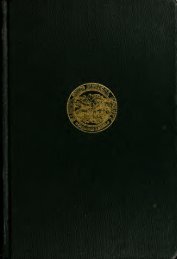- Page 2 and 3:
LIBRARY OF THEUNIVERSITY OF ILLINOI
- Page 5 and 6:
ILLINOIS NEWSPAPERDIRECTORYHISTORYo
- Page 7 and 8:
__________BoeiiQTACKS effiefc-Histo
- Page 9 and 10:
^Preftace.uring the four years whic
- Page 11 and 12:
190J-2SUniversity of Illinois Schoo
- Page 13 and 14:
HISTORY OF THE ILLINOISPRESS ASSOCI
- Page 15 and 16:
Illinois Ni * spaper Directory and
- Page 17 and 18:
Illinois Newspaper Directory and Hi
- Page 19 and 20:
Illinois \'i w si>ai»i r Directory
- Page 21 and 22:
Illinois Newspaper I)iki< umv and H
- Page 23 and 24:
Illinois Newspaper Directory and Hi
- Page 25:
Illinois Newspaper Directory and Hi
- Page 28 and 29:
Illinois Newspaper Directory and Hi
- Page 30 and 31:
Illinois Newspaper Directory and Hi
- Page 32 and 33:
Illinois Newspaper Directory and Hi
- Page 34 and 35:
Illinois Newspaper Directory and Hi
- Page 36 and 37:
Illinois Newspaper Directory and Hi
- Page 38 and 39:
Illinois Newspaper Directory and Hi
- Page 40:
Illinois Newspaper Directory and Hi
- Page 43 and 44:
Illinois Newspaper Directory and Hi
- Page 45 and 46:
Illinois Newspaper Direi ioky and H
- Page 48 and 49:
Illinois Newspaper Directory and Hi
- Page 50 and 51:
Illinois Newspaper Directory and Hi
- Page 52 and 53:
Illinois Newspaper Directory and Hi
- Page 54 and 55:
Illinois Newspaper Directory and Hi
- Page 56 and 57:
Illinois Newspaper Directory and Hi
- Page 58 and 59:
Illinois Newspaper Directory and Hi
- Page 60 and 61:
Illinois Newspaper Directory and Hi
- Page 62 and 63:
Illinois Newspaper Directory and Hi
- Page 64 and 65:
Illinois Newspaper Directory and Hi
- Page 66 and 67:
Illinois Newspaper Directory and Hi
- Page 68 and 69:
Illinois Newspaper Directory and Hi
- Page 70 and 71:
Illinois Newspaper Directory and Hi
- Page 72 and 73:
Illinois Newspaper Directory and Hi
- Page 74 and 75:
Illinois Newspaper Directory and Hi
- Page 76 and 77:
Illinois Newspaper Directory and Hi
- Page 78 and 79:
Illinois Newspaper. Directory and H
- Page 80 and 81:
Illinois Newspaper Directory and Hi
- Page 82 and 83:
Illinois Newspaper Dirfctory and Hi
- Page 84 and 85:
Illinois Newspaper Directory and Hi
- Page 86 and 87:
Illinois Newspaper Directory and Hi
- Page 88 and 89:
Illinois Newspaper Directory and Hi
- Page 90 and 91:
Illinois Newspaper Directory' and H
- Page 92 and 93:
Illinois Newspaper Directory and Hi
- Page 94 and 95:
Illinois Newspaper Directory and Hi
- Page 96 and 97:
Illinois Newspaper Directory and Hi
- Page 98 and 99:
Illinois Newspaper Directory and Hi
- Page 100 and 101:
Illinois Newspaper Directory and Hi
- Page 102 and 103:
Illinois Newspaper Directory and Hi
- Page 104 and 105:
Illinois Newspaper Directory and Hi
- Page 106 and 107:
Illinois Newspaper Directory and Hi
- Page 108 and 109:
Illinois Newspaper Directory and Hi
- Page 110 and 111:
Illinois Newspaper Directory and Hi
- Page 112 and 113:
Illinois Newspaper Directory and Hi
- Page 114 and 115:
Illinois Newspaper Directory and Hi
- Page 116 and 117:
Illinois Newspaper Directory and Hi
- Page 118 and 119:
Illinois Newspaper Directory and Hi
- Page 120 and 121:
Illinois Newspaper Directory and Hi
- Page 122 and 123:
Illinois Newspaper Directory and Hi
- Page 124 and 125:
Illinois Newspaper Directory and Hi
- Page 126 and 127:
Illinois Newspaper Directory and Hi
- Page 128 and 129:
Illinois Newspaper Directory and Hi
- Page 130 and 131:
Illinois Newspaper Directory and Hi
- Page 132 and 133:
Illinois Newspaper Directory and Hi
- Page 134 and 135:
Illinois Newspaper Directory and Hi
- Page 136 and 137:
Illinois Newspaper Directory and Hi
- Page 138 and 139:
Illinois Newspaper Directory and Hi
- Page 140 and 141:
Illinois Newspaper Directory and Hi
- Page 142 and 143:
Illinois Newspaper Directory and Hi
- Page 144 and 145:
Illinois Newspaper Directory and Hi
- Page 146 and 147:
Illinois Newspaper Directory and Hi
- Page 148 and 149:
Illinois Newspaper Directory and Hi
- Page 150 and 151:
Illinois Newspaper Directory and Hi
- Page 152 and 153:
Illinois Newspaper Directory and Hi
- Page 154 and 155:
Illinois Newspaper Directory and Hi
- Page 156 and 157:
Illinois Newspaper Directory and Hi
- Page 158 and 159:
Illinois Newspaper Directory and Hi
- Page 160 and 161:
Illinois Newspaper Directory and Hi
- Page 162 and 163:
Illinois Newspaper Directory and Hi
- Page 164 and 165:
Illinois Newspaper Directory and Hi
- Page 166 and 167:
Ilunois Newspaper Directory and His
- Page 168 and 169:
Illinois Newspaper Directory and Hi
- Page 170 and 171:
Illinois Newspaper Directory and Hi
- Page 172 and 173:
Illinois Newspaper Directory and Hi
- Page 174 and 175:
Illinois Newspaper Directory and Hi
- Page 176 and 177:
Illinois Newspaper Directory and Hi
- Page 178 and 179:
Illinois Newspaper Directory and Hi
- Page 180 and 181:
Illinois Newspaper Directory and Hi
- Page 182 and 183:
Illinois Newspaper Directory and Hi
- Page 184 and 185:
Illinois Newspaper. Directory and H
- Page 186 and 187:
Illinois Newspaper Dirfctory and Hi
- Page 188 and 189:
Illinois Newspaper Directory and Hi
- Page 190 and 191:
Illinois Newspaper Directory and Hi
- Page 192 and 193:
Illinois Newspaper Directory and Hi
- Page 194 and 195:
Illinois Newspaper Directory and Hi
- Page 196 and 197:
Illinois Newspaper Directory and Hi
- Page 198 and 199:
Illinois Newspaper Directory and Hi
- Page 200 and 201:
Illinois Newspaper Directory and Hi
- Page 202 and 203:
Illinois Newspaper Directory and Hi
- Page 204 and 205:
Illinois Newspaper Directory and Hi
- Page 206 and 207:
Illinois Newspaper Directory and Hi
- Page 208 and 209:
Illinois Newspaper. Directory and H
- Page 210 and 211:
Illinois Newspaper Directory and Hi
- Page 212 and 213:
Illinois Newspaper Directory and Hi
- Page 214 and 215:
Illinois Newspaper Directory and Hi
- Page 216 and 217:
Illinois Newspaper Dirfctory and Hi
- Page 218 and 219:
Illinois Newspaper Directory and Hi
- Page 220 and 221:
Illinois Newspaper Directory and Hi
- Page 222 and 223:
Illinois Newspaper Directory and Hi
- Page 224 and 225:
Illinois Newspaper Directory and Hi
- Page 226 and 227:
Illinois Newspaper Directory and Hi
- Page 228 and 229:
Illinois Newspaper Directory and Hi
- Page 230 and 231:
Illinois Newspaper Directory and Hi
- Page 232 and 233:
Illinois Newspaper Directory and Hi
- Page 234 and 235:
Illinois Newspaper Directory and Hi
- Page 236 and 237:
Illinois Newspaper Directory and Hi
- Page 238 and 239:
Illinois Newspaper Directory and Hi
- Page 240 and 241:
Illinois Newspaper Directory and Hi
- Page 242 and 243:
Illinois Newspaper Directory and Hi
- Page 244 and 245:
Illinois Newspaper Directory' and H
- Page 246 and 247:
Illinois Newspaper Directory and Hi
- Page 248 and 249:
Illinois Newspaper Directory and Hi
- Page 250 and 251:
Illinois Newspaper Directory and Hi
- Page 252 and 253:
Illinois Newspaper Directory and Hi
- Page 254 and 255:
Illinois Newspaper Directory and Hi
- Page 256 and 257:
Illinois Newspaper Directory and Hi
- Page 258 and 259:
Illinois Newspaper Directory and Hi
- Page 260 and 261: Illinois Newspaper Directory and Hi
- Page 262 and 263: Illinois Newspaper Directory and Hi
- Page 264 and 265: Illinois Newspaper Directory and Hi
- Page 266 and 267: Illinois Newspaper Directory and Hi
- Page 268 and 269: Illinois Newspaper Directory and Hi
- Page 270 and 271: Illinois Newspaper Directory and Hi
- Page 272 and 273: Illinois Newspaper Directory and Hi
- Page 274 and 275: Illinois Newspaper Directory and Hi
- Page 276 and 277: Illinois Newspaper Directory and Hi
- Page 278 and 279: Illinois Newspaper Directory and Hi
- Page 280 and 281: Illinois Newspaper Directory and Hi
- Page 282 and 283: Illinois Newspaper Directory and Hi
- Page 284 and 285: Illinois Newspaper Directory and Hi
- Page 286 and 287: Illinois Newspaper Directory and Hi
- Page 288 and 289: Illinois Newspaper Directory and Hi
- Page 290 and 291: Illinois Newspaper Directory and Hi
- Page 292 and 293: Illinois Newspaper Directory and Hi
- Page 294 and 295: Illinois Newspaper Directory and Hi
- Page 296 and 297: Illinois Newspaper Directory and Hi
- Page 298 and 299: Illinois Newspaper Directory and Hi
- Page 300 and 301: Illinois Newspaper Directory and Hi
- Page 302 and 303: Illinois Newspaper Directory and Hi
- Page 304 and 305: Illinois Newspaper Directory and Hi
- Page 306 and 307: Illinois Newspaper Directory and Hi
- Page 308 and 309: Illinois Newspaper Directory and Hi
- Page 312 and 313: Illinois Newspaper Directory and Hi
- Page 314 and 315: Illinois Newspaper Directory and Hi
- Page 316 and 317: Illinois Newspaper Directory and Hi
- Page 318 and 319: Illinois Newspaper Directory and Hi
- Page 320 and 321: Illinois Newspaper Directory and Hi
- Page 322 and 323: Illinois Newspaper Directory and Hi
- Page 324 and 325: Illinois Newspaper Directory and Hi
- Page 326 and 327: Illinois Newspaper Directory and Hi
- Page 328 and 329: Illinois Newspaper Directory and Hi
- Page 330 and 331: Illinois Newspaper Directory and Hi
- Page 332 and 333: Illinois Newspaper Directory and Hi
- Page 334 and 335: Illinois Newspaper Directory and Hi
- Page 336 and 337: Illinois Newspaper Directory and Hi
- Page 338 and 339: Illinois Newspaper Directory and Hi
- Page 340 and 341: Illinois Newspaper Dirfctory and Hi
- Page 342 and 343: Illinois Newspaper Directory and Hi
- Page 344 and 345: Illinois Newspaper Directory and Hi
- Page 346 and 347: Illinois Newspaper Directory and Hi
- Page 348 and 349: Illinois Newspaper Directory and Hi
- Page 350 and 351: Illinois Newspaper Directory and Hi
- Page 352 and 353: Illinois Newspaper Directory and Hi
- Page 354 and 355: Illinois Newspaper Directory and Hi
- Page 357: ^Directory ofIllinois ]S[ewspapers
- Page 360 and 361:
Illinois Newspaper Directory and Hi
- Page 362 and 363:
Illinois Newspaper Directory and Hi
- Page 364 and 365:
Illinois Newspaper Directory and Hi
- Page 366 and 367:
Illinois Newspaper Directory and Hi
- Page 368 and 369:
Illinois Newspaper Directory and Hi
- Page 370 and 371:
Illinois Newspaper Directory and Hi
- Page 372 and 373:
Illinois Newspaper Directory and Hi
- Page 374 and 375:
Illinois Newspaper Directory and Hi
- Page 376 and 377:
Illinois Newspaper Directory and Hi
- Page 378 and 379:
Illinois Newspaper Directory and Hi
- Page 380 and 381:
Illinois Newspaper Directory and Hi
- Page 382 and 383:
Illinois Newspaper Directory and Hi
- Page 384 and 385:
Illinois Newspaper Directory and Hi
- Page 386 and 387:
Illinois Newspaper Directory and Hi
- Page 388 and 389:
Illinois Newspaper Directory and Hi
- Page 390 and 391:
Illinois Newspaper Directory and Hi
- Page 392 and 393:
Illinois Newspaper Directory and Hi
- Page 394 and 395:
Illinois Newspaper Directory and Hi
- Page 396 and 397:
Illinois Newspaper Directory and Hi
- Page 398 and 399:
Illinois Newspaper Directory and Hi
- Page 400 and 401:
Illinois Newspaper Directory and Hi
- Page 402 and 403:
Illinois Newspaper Directory and Hi
- Page 404 and 405:
Illinois Newspaper Directory and Hi
- Page 406 and 407:
i "iIllinois Newspaper Directory an
- Page 408 and 409:
Illinois Newspaper Directory and Hi
- Page 410 and 411:
Illinois Newspaper Directory and Hi
- Page 412 and 413:
Illinois Newspaper Directory and Hi
- Page 414 and 415:
Illinois Newspaper Directory and Hi
- Page 416 and 417:
Illinois Newspaper Directory and Hi
- Page 418 and 419:
Illinois Newspaper Directory \nd Hi
- Page 420 and 421:
Illinois Newspaper Directory and Hi
- Page 422 and 423:
Illinois Newspaper Directory and Hi
- Page 424 and 425:
Illinois Newspaper Directory and Hi
- Page 426 and 427:
Illinois Newspaper Directory and Hi
- Page 428 and 429:
Illinois Newspaper Directory and Hi
- Page 430 and 431:
:POLO,Illinois Newspaper Directory
- Page 432 and 433:
Illinois Newspaper Directory and Hi
- Page 434 and 435:
Illinois Newspaper Directory and Hi
- Page 436 and 437:
Illinois Newspaper Directory and Hi
- Page 438 and 439:
Illinois Nlwspaper Directory and Hi
- Page 440 and 441:
Illinois Newspaper Directory and Hi
- Page 442 and 443:
Illinois Newspaper Directory and Hi
- Page 444 and 445:
;. deposits.Illinois Newspaper Dire
- Page 446 and 447:
Illinois Newspaper Directory and Hi
- Page 448 and 449:
Ii i.inois Newspaper Directory and
- Page 450 and 451:
Illinois Newspaper Directory and Hi
- Page 452 and 453:
Ii i inoisNewspaper Dirtc tory and
- Page 454 and 455:
Illinois Newspaper Directory and Hi
- Page 456 and 457:
Illinois Newspaper Directory and Hi
- Page 458 and 459:
Illinois Newspaper Directory and Hi
- Page 460 and 461:
Illinois Newspaper Directory and Hi
- Page 462 and 463:
Illinois Newspaper Directory and Hi
- Page 464 and 465:
Illinois Newspaper Directory and Hi
- Page 466 and 467:
Illinois Newspaper Directory and Hi
- Page 468 and 469:
Illinois Newspaper Directory and Hi
- Page 470 and 471:
Illinois Newspaper Directory and Hi
- Page 472 and 473:
jIllinois Newspaper Directory and H
- Page 474 and 475:
Illinois Newspaper Directory and Hi
- Page 476 and 477:
Illinois Newspaper Directory and Hi
- Page 478 and 479:
Illinois Newspaper Directory and Hi
- Page 480 and 481:
Illinois Newspaper Directory and Hi
- Page 482 and 483:
Illinois Newspaper. Directory and H
- Page 484 and 485:
Illinois Newspaper Directory and Hi
- Page 486 and 487:
Illinois Newspaper Dirfltory and Hi
- Page 488 and 489:
Illinois Newspaper Directory and Hi
- Page 490 and 491:
Illinois Newspaper Directory and Hi
- Page 492 and 493:
Illinois Newspaper Directory and Hi
- Page 494 and 495:
Illinois Newspaper Directory and Hi
- Page 496 and 497:
Illinois Newspaper Directory and Hi
- Page 498 and 499:
Illinois Newspaper Directory and Hi
- Page 500 and 501:
Illinois Newspaper Directory and Hi
- Page 502 and 503:
Illinois Newspaper Directory and Hi
- Page 504 and 505:
Illinois Newspaper Directory and Hi
- Page 506 and 507:
:-TOWERIllinois Newspaper Directory
- Page 508 and 509:
Illinois Newspaper Directory and Hi
- Page 510 and 511:
Illinois Newspaper Directory and Hi
- Page 512 and 513:
Illinois Newspaper Directory and Hi
- Page 514 and 515:
Illinois Newspaper Directory and Hi
- Page 516 and 517:
Illinois Newspaper Directory and Hi
- Page 518 and 519:
Illinois Newspaper Directory and Hi
- Page 520 and 521:
Illinois Newspaper Directory and Hi
- Page 522 and 523:
Illinois Newspaper Directory and Hi
- Page 524 and 525:
Illinois Newspaper Directory and Hi
- Page 526 and 527:
.CarrollIllinois Newspaper Director
- Page 528 and 529:
Illinois Newspaper Directory and Hi
- Page 530 and 531:
Illinois Newspaper Directory and Hi
- Page 532 and 533:
Illinois Newspaper Directory and Hi
- Page 534 and 535:
Illinois Newspaper Directory and Hi
- Page 536 and 537:
;CHENOAIllinois Newspaper Directory
- Page 538 and 539:
Illinois Newspaper Directory and Hi
- Page 540 and 541:
Illinois Newspaper Directory and Hi
- Page 542 and 543:
Illinois Newspaper Directory and Hi
- Page 544 and 545:
Illinois Newspaper Directory and Hi
- Page 546 and 547:
Illinois Newspaper Directory and Hi
- Page 548 and 549:
Illinois Newspaper Directory and Hi
- Page 550 and 551:
Illinois Newspaper Directory and Hi
- Page 552 and 553:
Illinois Newspaper Directory and Hi
- Page 554 and 555:
Illinois Newspaper Directory and Hi
- Page 556 and 557:
Illinois Newspaper Directory and Hi
- Page 558 and 559:
Illinois Newspaper Directory and Hi
- Page 560 and 561:
Illinois Newspaper Directory and Hi
- Page 562 and 563:
Illinois Newspaper Directory and Hi
- Page 564 and 565:
Illinois Newspaper Directory and Hi
- Page 566 and 567:
Illinois Newspaper Directory and Hi
- Page 568 and 569:
Illinois Newspaper Directory and Hi
- Page 570 and 571:
Illinois Newspaper Directory and Hi
- Page 572 and 573:
Illinois Newspaper Directory and Hi
- Page 574 and 575:
Illinois Newspaper Directory and Hi
- Page 576 and 577:
Illinois Newspaper Directory and Hi
- Page 578 and 579:
::AUSTINITE:Illinois Newspaper Dire
- Page 580 and 581:
::UNITEDIllinois Newspaper Director
- Page 582 and 583:
Illinois Newspaper Directory and Hi
- Page 584 and 585:
Illinois Newspaper Directory and Hi
- Page 586 and 587:
">Illinois Newspaper Directory and
- Page 588 and 589:
Illinois Newspaper Directory and Hi
- Page 590 and 591:
Illinois Newspaper Directory and Hi
- Page 592 and 593:
Illinois Newspaper Directory and Hi
- Page 594 and 595:
Illinois Newspaper Directory and Hi
- Page 596 and 597:
Illinois Newspaper Directory and Hi
- Page 598 and 599:
. .1, .|I i iIllinois Newspaper Dir
- Page 600 and 601:
Illinois Newspaper Directory and Hi
- Page 602 and 603:
Illinois Newspaper Directory and Hi
- Page 604 and 605:
Illinois Newspaper Directory and Hi
- Page 606 and 607:
Illinois Newspaper Directory and Hi
- Page 608 and 609:
Illinois Newspaper Directory and Hi
- Page 610 and 611:
Illinois Newspaper Directory and Hi
- Page 612 and 613:
Illinois Newspaper Directory and Hi
- Page 615:
(Past ^Presidents
- Page 618 and 619:
Illinois Newspaper Directory and Hi
- Page 620 and 621:
Illinois Newspaper Directory and Hi
- Page 622 and 623:
Illinois Newspaper Directory and Hi
- Page 624 and 625:
IIllinois Newspaper Directory and H
- Page 626 and 627:
Illinois Newspaper Directory and Hi
- Page 628 and 629:
Illinois Newspaper Directory and Hi
- Page 630 and 631:
Illinois Newspaper Directory and Hi
- Page 632 and 633:
Illinois Newspaper Directory and Hi
- Page 634 and 635:
Illinois Newspaper Directory and Hi
- Page 636 and 637:
Illinois Newspaper Directory and Hi
- Page 638 and 639:
Illinois Newspaper Directory and Hi
- Page 640 and 641:
Illinois Newspaper Directory and Hi
- Page 642 and 643:
Illinois Newspaper Directory and Hi
- Page 644 and 645:
Illinois Newspaper. Directory and H
- Page 646 and 647:
Illinois Newspaper Directory and Hi
- Page 649:
Hall of Jame
- Page 652 and 653:
Illinois Newspaper Directory and Hi
- Page 654 and 655:
Illinois Newspaper Directory and Hi
- Page 656 and 657:
Illinois Newspaper Directory and Hi
- Page 658 and 659:
Illinois Newspaper Directory and Hi
- Page 660 and 661:
Illinois Newspaper Directory and Hi
- Page 662 and 663:
Illinois Newspaper Directory and Hi
- Page 664 and 665:
Illinois Newspaper Directory and Hi
- Page 666 and 667:
Illinois Newspaper Directory and Hi
- Page 668 and 669:
inoishiNewspaper Dirf.ctoky and His
- Page 670 and 671:
Illinois Newspaper Directory and Hi
- Page 672 and 673:
Illinois Newspaper Directory and Hi
- Page 674 and 675:
Illinois Newspaper Directory and Hi
- Page 676 and 677:
Illinois Newspaper Directory and Hi
- Page 678 and 679:
Illinois Newspaper Directory and Hi
- Page 680 and 681:
Illinois Ne\/spaper Directory and H
- Page 682 and 683:
Illinois Newspaper Directory and Hi
- Page 685:
Collaborators
- Page 688 and 689:
i\ im\ois i»bo\iiicBurlinglon Trac
- Page 690 and 691:
CHICAGO & NORTH WESTERN RY.divm: on
- Page 692 and 693:
5^5S&£-rniomii- CLsstnibottu:^ACHE
- Page 694 and 695:
N 1867 Philip D. Armour, a young me
- Page 696 and 697:
o1The PilotThe master of an oceanli
- Page 698 and 699:
Illinois Central toForeign lands Ne
- Page 700 and 701:
McKinley Bridge Across Mississippi
- Page 702 and 703:
East St. Louis, IllinoisServed with
- Page 704 and 705:
Printing is the forerunner of progr
- Page 706 and 707:
Wieu/* along The MILWAUKEE RO/1DAME
- Page 708 and 709:
44 YEARS OFPROGRESSIn helping to lo
- Page 710 and 711:
A fine, fast, through trainbetweenS
- Page 712:
Utilities Power & Light Corporation
- Page 715 and 716:
I)n. E. L. CornellDr. Edward Lyman
- Page 717 and 718:
This year Montgomery Ward & Co.is i
- Page 719 and 720:
ILSWilson & Co.1/ e a i I' n c /. e
- Page 721 and 722:
A Standard For QualityThe Whiting t
- Page 723 and 724:
••// is our earnest wish that t
- Page 725 and 726:
For aCourteous RideWith a Competent
- Page 727 and 728:
The IllinoisCommerceChamber ofThe I
- Page 729 and 730:
Borden Farm Products CompanyOF ILLI
- Page 731 and 732:
A Life SketchLeading Up ro the Pres
- Page 733 and 734:
urbanizedBUILT ON THE PRINCIPLE OFS
- Page 735 and 736:
Chicago Surface LinesThe Chicago Su
- Page 737 and 738:
Chicago Stadium Corporation(An Illi
- Page 739 and 740:
CHICAGONATIONAL LIFENSURANCECOMPANY
- Page 741 and 742:
729
- Page 743 and 744:
J LI M(.\N GENERATING STA-TION, PIB
- Page 745 and 746:
Bradner SmithPaper Merchants& Compa
- Page 747 and 748:
i'.i i i Moundi imiNIndex to Direct
- Page 749 and 750:
I nwI i i inghamIldoradoi i izabeth
- Page 751 and 752:
Index to Directory of Illinois News
- Page 753 and 754:
i i:Index to Directory of Illinois
- Page 755 and 756:
Index to Past Presidents
- Page 760:
IUNIVERSITY OF ILLINOIS-URBANA070 6










